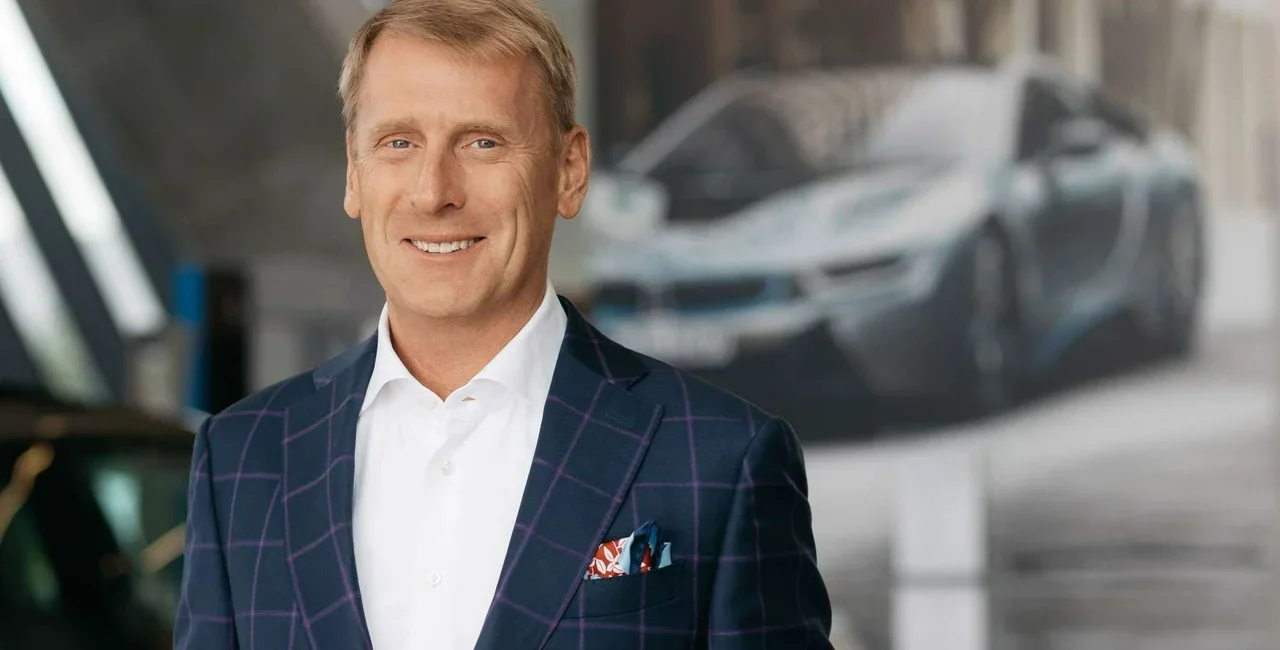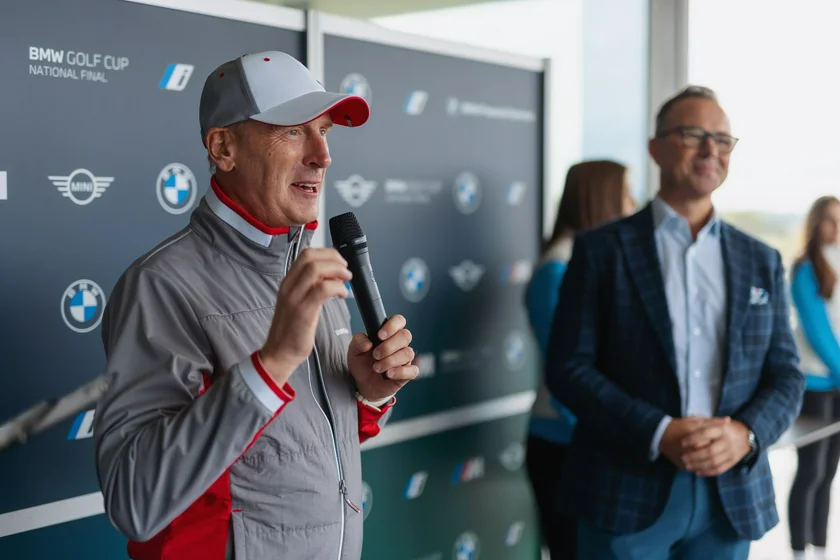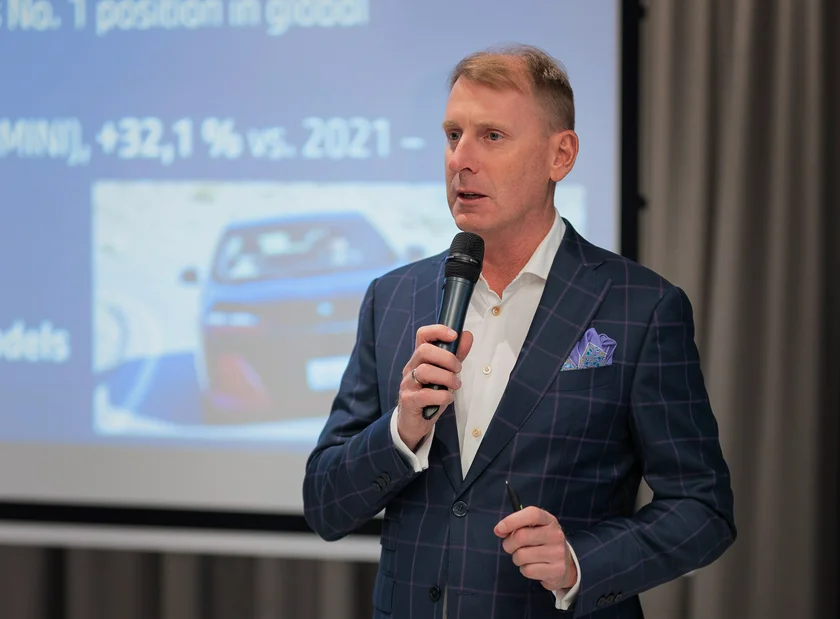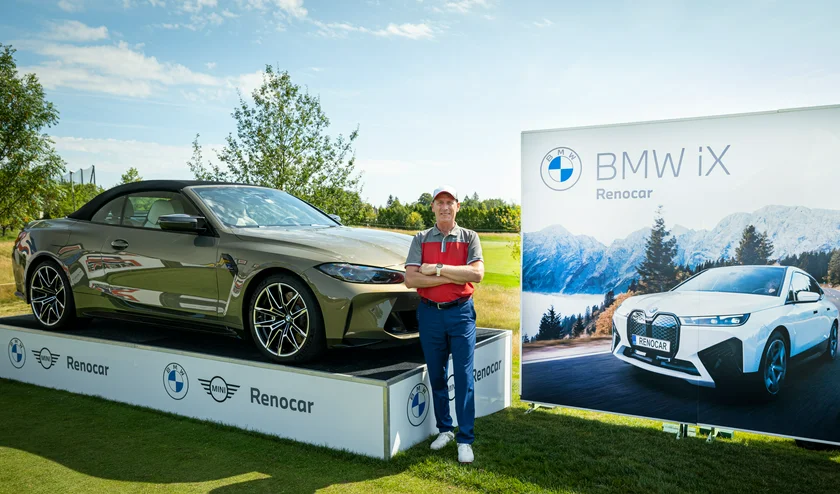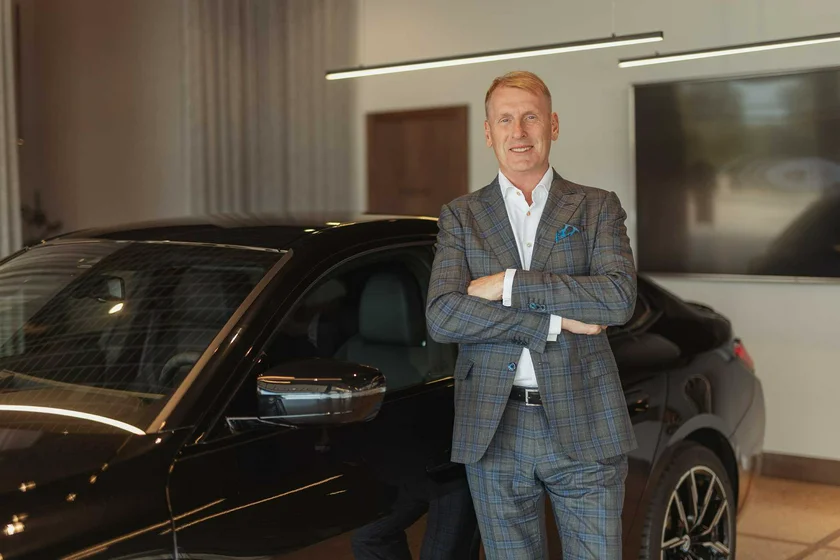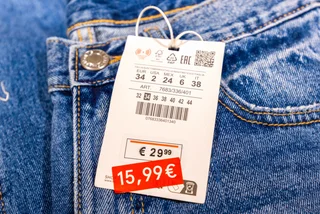Recent years have been tough for the car industry, but one company has passed the tests of the pandemic and war in Ukraine with flying colors. BMW’s successful year in Czechia in 2022 contrasts strongly with other companies that suffered significant issues in production and sales.
Now, the company is pressing ahead with ambitious projects in Central Europe, including the creation of an autonomous driving testing site in the Karlovy Vary region and a major new car production plant in Hungary.
Expats.cz spoke to Maciej Galant, BMW’s General Manager for Czechia, about the brand’s evolution, its vision for the Czech market, and how BMW is innovating ways to make the cars of the future greener, leaner, and more sustainable.
Before arriving in Czechia, you held leadership roles in other Central and Eastern European markets, such as Hungary, Slovenia and Poland. What’s your personal story with BMW and how does Czechia compare to those other markets?
I took something of a winding route into the automotive industry. I’m originally from a harbor city in the north-west of Poland, close to the border with Germany; I went to Berlin far more than Warsaw in my early years, and I’d say this gave me a kind of western perspective.
Following in my father’s footsteps as a mariner, my first work was in the maritime industry. I spent two and a half years on the ocean in every weather, but eventually decided that the sea is great for the fish, but not for a man!
I then worked for Shell Gas during the early stage of its development in Poland. Companies were looking for people who were educated and spoke English; that combination was quite rare in Poland at the time, because people previously learned Russian instead of English. Later, I switched to the banking sector, which took me to Warsaw.
I moved into the automotive sector with a job as sales director for BMW in Poland, during a period of rapid growth. After the financial crisis of 2008-2009, we introduced professional financial services and innovative leasing models which opened up more expensive car models to more people. This boosted sales, and we more than doubled our number of dealerships.
Then I was promoted and moved to Slovenia as General Manager. Slovenia was a small market with a difficult economic background. But Slovenes are lovers of “green motion.” One of the first things you notice is their national focus on being green, and it’s where I developed my interest in sustainable initiatives. Everyone wants to be the “greenest,” because they love the beautiful forest environment that surrounds them. It’s a fantastic place for sports too; you can go from playing golf by the sea in the morning, to skiing in the mountains in the evening.
Then I went to Budapest, and after a couple of months, the pandemic hit. We survived it pretty well, because the restrictions weren’t as great as they were here. Hungary never had closed showrooms, or closed after-sales. It was still possible to buy a car, although we had some restrictions in production. I’ve been in Prague since May 2022.
When I was a seaman, I sailed from port to port, and nothing has really changed since then. I just travel by land instead!
And how are you finding Prague?
I love absorbing what I can about every place where I live, accepting how things are in each country and enjoying what’s special. I’m living in Vinohrady, which I like very much: since I’m Polish, I could only live on Polska street!
I do sports every day, whether it's gym, running, cycling, skiing, playing golf, or sailing. There’s a beautiful road for cycling to the south of Prague, and the golf courses here are amazing. I’ve never seen so many well-developed and maintained clubs in the Central Europe region.
I also like how I can walk across the whole city by foot from Vinohrady. Everywhere is within 30 minutes’ walking distance, which makes a big difference. It’s also very safe here, unlike the other cities where I have worked.
2022 was a successful year for BMW in Czechia, while other car makers struggled. What’s the secret of your success?
If you look at car registrations on a global basis, BMW is the most successful premium brand, even though the whole industry experienced headwinds, including a shortage of semiconductors, which are needed in even greater quantities as the technology of cars develops.
As a manufacturer, we tackled the crisis in the most efficient way possible. Our production sites are located in different parts of the globe, but we try to source suppliers from within the region where the production plant operates.
For example, we have a new production site in Debrecen, Hungary, which will build what we are calling Neue Klasse or “New Class” cars, designed and developed specifically for Europe. This will involve a large number of suppliers from the surrounding areas in Hungary, Slovakia, and Ukraine.
On the specific issue of semiconductors, we make a lot of cars in America, where production of semiconductors is much higher than in Europe. We had our own suppliers making them specifically for BMW. At the same time, we chose to reduce production of smaller vehicles in Europe, and focus on the production of higher class vehicles. This resulted in us being number one in the premium segment for 2022 on a global level and this strategy was very successful for the whole brand, including in the Czech Republic.
How did focusing on premium cars play out in a stereotypically cost-conscious market like Czechia? Aren’t Czechs more conservative when spending money than people in Germany, for example?
It’s actually vice versa. People here like to show off with a big car. While an average family in Germany might go for our X1, because it’s enough for their needs, here that same family would go for the X5. You have to remember that we in this region were living under a Communist system for so many years. People were hungry for luxury and for expressing individuality, which wasn’t allowed before.
People think: if we can afford it, then why not buy something that brings us pleasure? They enjoy driving big cars, they enjoy driving fast vehicles; they would often rather choose a powerful V8 engine than an electric model. Being situated in the heart of Europe, Czechs tend to drive a lot, including for business, and our cars ensure great comfort for business travel as well as safety.
When you sit in a BMW, you immediately feel “the joy of driving.” That’s what we say, and that’s how it is. We design cars for drivers.
What are your most popular models on the Czech market?
Our primary segment is small- and medium-sized vehicles, such as the X3 and 3-series up to the 5-series and the X5. This is the segment where we sell the most. We sell less of the really big cars, like the 7 and 8 series, but this segment is still substantial; this year we expect to sell 600 to 700 vehicles of this type. We’re now introducing the 7-series with a hybrid engine, and we also have a face-lift of the X5 and X6.
For the first time ever, we have an M3 Touring model, which is sold-out worldwide already. Last year we introduced the X1, which is fully sold-out for this year. We’re also going to introduce a new, fully electric Mini Countryman; our production plant in Leipzig will make this car using only sustainable energy.
We are doubling our electric vehicle sales year-on-year, and this year we aim to sell more than 400 fully electric cars in Czechia. This includes the fully electric i7, as well as the new electric model of the 5-series coming this autumn, and the electric iX1. Our 4-series Gran Coupe won Car of the Year last year, the first ever electric car to win this award on the Czech market, and there’s very high demand for this vehicle too.
Automotive technology is changing very rapidly; what are the biggest innovations that BMW is pioneering in the automotive sector?
Our “New Class” development in Hungary will redefine what we are doing in car development. It’s based on our philosophy that cars must be “green, lean, digital, and fully-electric.”
This means developing completely new elements. For example, we will stop using regular leather, and instead use artificial leather made from plants that has the same consistency and durability. We also want our cars to be 100 percent circular, meaning every element can be reused.
Another key development is our efforts to make the experience of using an electric vehicle as similar as possible to using a petrol vehicle. If you go to the charging station, you shouldn’t have to spend 45 minutes charging your car; it should be just a few minutes. That’s what the New Class will bring when it’s released in 2025.
Releasing the New Class vehicle will also include a grand opening for the new plant in Hungary, which is the first ever BMW production plant in the so-called Visegrád market of Poland, Hungary, the Czech Republic and Slovakia.
In Czechia, our investment in Sokolov is also very substantial, totaling more than €300 million. Crucially, it’s not just for the Czech market; it’s part of the global development of BMW, because we will use this plant for developing autonomous driving systems. More advanced systems are needed for autonomous cars to deal with driving in various different countries, types of road, and traffic scenarios. This requires huge amounts of testing, which will be the purpose of the Sokolov site, as a dedicated testing workshop for autonomous technology.
Why was Czechia chosen for this innovative development, and when will it be ready?
First of all, it’s very close to Munich. It’s in the center of Europe, on a re-cultivated brownfield site, which ties in with our emphasis on being a global company that invests in under-developed areas to re-cultivate them and help them “go green”. This was formerly a very polluted area, but now it has been revitalized with solutions for helping wildlife. There is also a relatively high unemployment rate in the Karlovy Vary region, so our center will help by employing people from local cities and villages.
The site is currently in a pre-testing period, with the full start of operations planned for the middle of this year. We expect to hire up to 100 people when the site is fully operational. Recruiting people from Czechia will be our priority, and we are already seeing nationwide interest in working at the site.
Looking at another area of innovation, how do you ensure sustainable production of cars?
Certain locations have specific sustainability properties; in the “New Class” plant in Debrecen, 100 percent of the energy supply will be green energy. But this is a global trend, because BMW wants to be the most green car manufacturer in the world. Our first completely carbon-neutral plant was built in Leipzig, and now, every other plant is built based on green energy principles; either buying green energy, or generating it ourselves at the production site.
We have initiatives throughout our operations, and we ensure that our suppliers follow the same philosophy. For example, we only use transport suppliers who can do their job with the least harm to nature, or who have initiatives to balance out any harm caused by their activities.
For materials in cars, we have initiatives to use heat-free carbon steel, which is not made in a regular way by burning lots of coal. This is a future solution, which we are testing now in order to be ready whenever large-scale production makes it available in sufficient quantities.
Another initiative is hydrogen-powered vehicles. We are very active in this field, because hydrogen is a very clean energy capable of powering vehicles; providing, of course, that the hydrogen itself is produced sustainably.
When choosing suppliers, we only deal with certified, proven companies, and we set even higher standards for them to become a BMW supplier. It’s a demanding process; they must, for example, show the ability to design a part using less energy for production while making the part even stronger and better than the standards that we set.
Do customers care about sustainability when buying a car?
Attitudes vary from country to country. As I mentioned, in Slovenia, this is a huge topic among the general public. But it also depends on government measures, such as the taxes affecting electric vehicles. Perceptions of green solutions change depending on whether they save you money, or cost you more. People may want to be green and buy an electric car, but if it costs twice as much as a regular car, they might decide to compromise instead.
Many Czech people, when buying a second car, go for a plug-in hybrid or electric. It’s a good choice, because you can park in the city free of charge, which is a big privilege, while the range of these cars is great. We see that the demand for such vehicles is based on a combination of principles and practical concerns.
We hope that by around 2024, 25 percent of all our car sales in the Czech Republic could be electric. This proves that interest is going up, and we’re very excited to see public attitudes changing in a positive way.
This article was written in cooperation with BMW Czech Republic s.r.o. Read more about our partner content policies here.












 Reading time: 10 minutes
Reading time: 10 minutes 